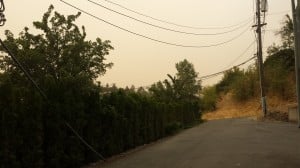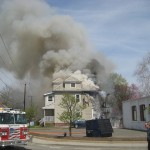What would it be like for the Pagan community to be completely mainstream? Not a majority religion, but such a common minority group as to be no different from any other minority religion? For many of you reading this, I suspect that seems like a fantasy for a far off, theoretical future. From where I’m sitting, it feels like we are already there. Wherever I go, there is Pagan community of some kind. Just a few clicks and a search, and I can find an open ritual pretty much anywhere in the English speaking world. Even when I don’t search, I randomly run into Pagans on train rides and in grocery stores throughout my travels. So, the question that we’ve been asked here at Patheos Pagan about what it is we’d like to build in the Pagan community may look a little different from my perspective. Sure I have a wish list of things that I’d like for the community, but they aren’t necessarily the ones that others have mentioned.
Someone commented on Facebook that they would like to have Pagan temples in the community. In Washington State we have the Aquarian Tabernacle Church that’s been around for more than 30 years, and a handful of other Pagan community centers and temples. In the UK there are standing stones and ancient places. But most of all, my favorite temple is the one built by living trees, just walking outside in the forest. I don’t particularly want to build more temples, though I wouldn’t stand in the way of people who do.
A decade ago, many people wished that there was a seminary for training Pagan ministers. Such a place exists now, however, I will admit that I have some mixed feelings about Pagan seminaries. If you want to go to seminary, that’s fine. You go and do that. I’m actually staying in the home of one of the professors there right now, and I can tell you she’s a great teacher. I just hope that the professionalization of Pagan priests’ training won’t get in the way of my ministerial work. Too often, the existence of an academic path in an area of study leads quickly to the licensure of that area and/or the censure of anyone who has not taken the Approved Path. The older I get the more firmly I stand on the side of a combination of unschooling and listening to the voices of the Land, Spirits and Gods we follow rather than the path of Western academia. Mentorship is clearly an important component of becoming a competent provider of ministerial services and support, but we will be much poorer if we shut out paths to Pagan ministry that don’t follow the Western Academic tradition.
When I had young children, I wanted a community of other families around so that I could expose my children to other Pagans. As parents, we all wanted to provide some sort of communal religious education for our children. I’m so glad that we were able to do that. On the other hand, I wouldn’t want Sunday school to become a thing that was expected of all covens or groves, or for that work to be taken out of the hands of the parents themselves. I believe strongly that we, the parents and grandparents, uncles, aunts and godparents of the children must take personal responsibility for our children’s religious education, and not leave it to teachers. Sure, we can work with teachers if that’s what works best for a community, but it should always remain first and foremost the responsibility of the family.
I would like to see the Pagan community get over the notion that priests, chaplains, teachers, and other religious workers should do all their work for free. If you are serving a community of 20 families, as I have done in the past, that’s a full time job. Doing that work on top of your full time job leads to burn out quite quickly. Either that, or the community doesn’t get the full range of support from their priest or priestess, and then who gets a call in the middle of the night and comes to your side in the hospital? Who helps a family through bereavement? Who counsels the couple before their handfasting? Who explains to new parents and prospective godparents what the range of responsibilities of godparenting are?
I would like to see the Pagan community engage in broader charitable work as Pagans. There are Christian charities that build homes for the poor and Jewish charities that feed the hungry. Churches, synagogues and temples of all sorts organize community service projects that their members may take part in throughout the year. Our covens and groves should do the same. We should be involved in work that increases the resilience of our towns and cities. Just as there are Catholic Hospitals and Evangelical medical clinics, I would like to see the Pagan community build health centers of our own. (Perhaps just like Catholic hospitals refuse to do elective abortions, we could refuse to use unnecessary pharmaceuticals and focus instead on research-backed plant medicines whenever possible.) To do that charitable work, however, we need to be willing to put up the money to make it happen, because a sustainable non-profit can’t function on volunteer hours alone.
I would like to see the Pagan community accentuate our similarities and accept our differences without requiring labels or a specific set of esoteric knowledge. The world is much bigger than your understanding of it or mine. There is more occult knowledge available than anyone could ever possibly process. If someone self-labels as one thing or another, but they don’t fit your idea of what that label means, ask them to describe more about their path, but don’t try to change their label. Accept them as an individual and accept them as someone who is trying to find their own place within community. Open up the room in your life for multiple communities, for some separate and some blended spaces, for the widest possible definition of “family” and the widest possible definition of “community”. Because, frankly, we have so much more we can do together.
This month, Patheos Pagan writers consider the question, “As Pagans, what do we want to build?” Click through to check out the full prompt, followed by a response by Yvonne Aburrow.












